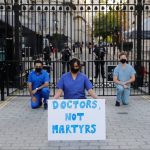Protecting health workers, a central mission of PHR, has taken on new urgency during the COVID-19 pandemic, as medical and health professionals face dangerous shortages of protective equipment, retaliation for speaking out, and physical violence for caring for the sick. Amid these mounting threats, PHR Board Member and The Lancet Editor-in-Chief Richard Horton moderated a high-level international conversation for PHR’s COVID webinar series on how we can better protect and support health care workers in their critical roles. Below are excerpts from his remarks. Dr. Horton’s new book, The COVID-19 Catastrophe, was published in June.
Back in March and April, I started to receive messages from frontline health care workers battling COVID-19 in the United Kingdom. “The hospitals in London are overwhelmed, brutal on the ground.” “It’s terrifying for staff, still no access to personal protective equipment or testing. I don’t feel safe.” “We’re literally making this up as we go along.” “It feels as if we are actively harming patients.” “We need protection, total carnage, humanitarian crisis.”
Every morning, I would wake up to literally dozens of messages like this – every day for over a month. We were putting our health care workers in the middle of an emergency with no protection whatsoever. And the long-term consequences on their physical and their mental health are impossible to imagine. Our countries, despite the assurances from many governments, were simply not prepared, despite decades of warnings that a pandemic would at some point engulf the world, as pandemics have done repeatedly.
We knew we needed to be ready for a surge in demand for medical supplies, for emergency stockage, and for regional production. But we didn’t do it. Many governments, in fact, felt so secure about their emergency provisions that they scaled back stockpiles of equipment.
We were also not prepared for the disproportionate way that COVID-19 has impacted communities of color and others in vulnerable settings. This pandemic has not leveled us, as some said it would. On the contrary, it has accentuated and exploited existing inequalities across our society with frightening facility. In conflict zones, where violence is already embedded in societies – places like Afghanistan, Libya, Pakistan, Palestine, Somalia, Yemen – COVID-19 has exacerbated the potential and the reality of that violence. Women, particularly, are bearing the brunt and the burden of this as caregivers and are suffering with their families in areas of acute fragility.
This pandemic has not leveled us, as some said it would. On the contrary, it has accentuated and exploited existing inequalities across our society with frightening facility.
And as infections and deaths from COVID-19 rise, fears engendered by the spread of the disease are bringing out some of the worst of humanity. The secretary-general of the United Nations has repeatedly drawn attention to the xenophobia and hate speech that has been unleashed by this pandemic. It has led to a “crescendo of violence,” in the words of Otmar Kloiber, secretary general of the World Medical Association, in which physical violence has somehow become more acceptable in society. Egregiously, this violence is often leveled at health care workers, who are targeted by those who perceive them not as critical and courageous actors in the fight against COVID-19, but as vectors of the disease.
We need to do much more to protect the doctors, nurses, technicians, ambulance drivers, and all the health care workers who are relentlessly and selflessly putting their own physical and psychological well-being on the line every day to stop COVID-19. Governments must dedicate resources for personal protective equipment and ensure that health workers’ voices are heard and protected, but they must also call out and punish acts of violence that target those on the front lines of the pandemic.
When one looks back at the history of epidemics and pandemics, we can be sure of one thing: this pandemic will change society. The number of infections, the number of deaths – many of them avoidable deaths – will change the expectations and demands of the public on governments. And this pandemic will, as a result, change governments.
We need to do much more to protect the doctors, nurses, technicians, ambulance drivers, and all the health care workers who are relentlessly and selflessly putting their own physical and psychological well-being on the line every day to stop COVID-19.
We will see a rebirth of the state, which has such a critical part to play in rebuilding health systems and strengthening social protections. We will see this change medicine and change science. It will highlight the importance of public health and primary care in strengthening individual health security as a mechanism for strengthening global health security.
And it will demand accountability. The promises and commitments that have been made by presidents and prime ministers will be expected to be delivered by a frustrated public who’ve seen their governments so often fail.
This is going to be a moment of instability, but also a moment of transformation. And it’s up to all of us to seize that moment, seize that opportunity – which should give us great hope for the possibilities for the future.
These are unprecedented times, in which we are witnessing an acute and chronic human emergency on our planet. Navigating our way through this is going to be one of the greatest challenges our species has ever faced.

